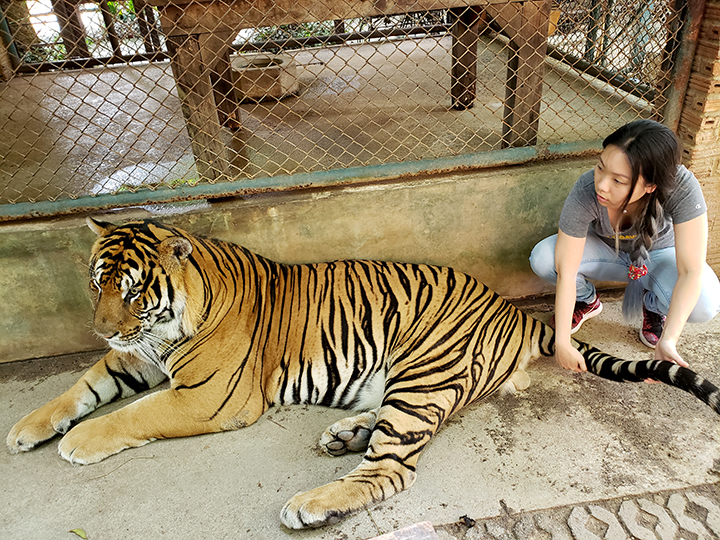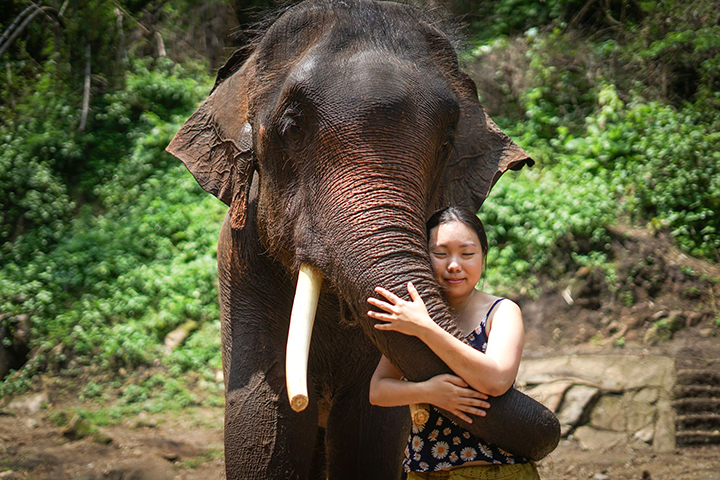Tracy Hayward - Thailand
Tracy Hayward - Thailand
This summer, I flew over 10,000 miles to Thailand to conduct research on the effect of quality of life on the human-animal bond in Thai elephant keepers and tiger caretakers. One of the oldest human-animal relationships is between mahouts and elephants. Thailand is a special place where there are many kinds of human-animal relationships. Due to changes in social policy and increasing commercialization of animal tourism, many kinds of exotic animals are trained by human caregivers and live in captivity. Animal tourism -- specifically, elephant and tiger tourism -- is an important source of income for the government and the economy. The unique human-animal relationships that arise across these two industries make Thailand an ideal country to evaluate and make comparisons of the influence of the caretaker’s quality of life on the human-animal bond.
I placed myself among people who speak different languages, grew up with dissimilar cultures, and living in unique ways of life. I visited 7 different elephants and tigers sanctuaries, interviewed 72 mahouts and tiger trainers. I was on a quest to find humans and animals living together in harmony. I had been slowly giving a window into the mahout’s way of life. They took me in as a part of their family. I learned about basic wildlife husbandry, behavior, and handling from the mahouts and tiger trainers. Clinical-wise, I was in the wildlife veterinarians of Kasetsart University team, working off-site to sedating tigers for physical exams and abdominal ultrasound. With the Elephant Thai nation hospital, I was involved in many emergency cases such as Elephant Endotheliotropic Herpes Virus, Enteritis, and intestinal obstruction. Through treatment procedures, I participated in an Asian elephant blood cross-match research for plasma transfusion among elephants. I had improved many clinical and research skills.
With the experiences which are not limited to the clinical setting, I had improved my interpersonal skills, good listening skills, emotional maturity by conducting in-depth interviews. As an interview conductor, I advanced my ability in client communication, collecting and analyzing the data. I also strengthen my problem solving and decision-making skills.
Co-operating with the Veterinary faculty of Kasetsart University, Thailand was an exceptional experience. Dr. Supaphen Sripiboon is an excellent role model. She guided me in developing new skill sets to improve my clinical acumen, relevant in both clinical and research settings. The experiences enhanced my analytical mindset and clinical thinking through obstacles that are necessary to diagnose and treat animals I will encounter in the future. I hope to foster and develop professional connections between the University of California Davis, School of Veterinary Medicine and Veterinary faculty at Kasetsart University as well as the greater Thai veterinary community.
I widened my horizon and fostered my understanding of cultural awareness. We shared our thoughts from different perspectives in a peaceful manner. At the end of the day, I learned that we all seek for an answer to benefit all species. It is not about my way or your way, it is about our multiple ways to achieve the best solutions.
The global program gave me an opportunity to expand my horizons. I made some great memories, met fascinating people and got to help some amazing animals. This trip inspired me to keep moving forward in veterinary medicine. Step by step, to make this world a better place, not only for humans nor animals but for all species.


